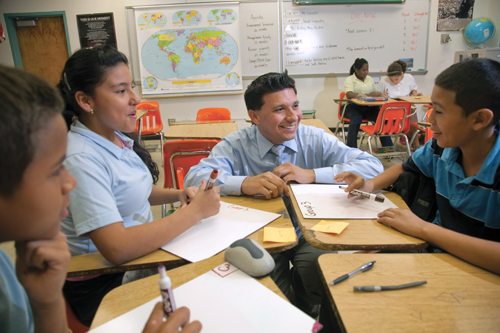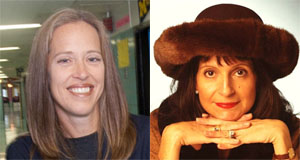

"Teach For America exists to address the incredible gaps in educational outcomes that persist along racial and socio-economic lines in our country. We believe this is the greatest civil rights issue of our generation." -- Wendy Kopp
Since Teach For America was proposed by Wendy Kopp in 1989, the organization's nearly 33,000 participants have reached more than 3 million children nationwide during their two-year teaching commitments. In 2007, Kopp co-founded Teach For All, a global network of independent nonprofit organizations that are applying the model pioneered by Teach For America around the world.
This week in the Global Search for Education, I asked Wendy Kopp, founder and CEO of Teach For America and of Teach For All to share her perspectives on some of the key issues that currently challenge the teaching profession, and on the contributions her organizations continue to make.
Kopp is the author of the Washington Post bestseller, A Chance to Make History: What Works and What Doesn't in Providing an Excellent Education for All, and of One Day, All Children: The Unlikely Triumph of Teach For America and What I Learned Along the Way.
Ban Ki-moon's Education First initiative states two million more teachers are needed for the world's poorest countries. Is there a role for Teach For America in this initiative?
I am excited about this initiative for all the obvious reasons. It represents such an important first ever recognition that we have to put education at the center of our global agenda. The mission that unites all of the programs of the Teach For All global network is that of cultivating the leadership capacity critical to ultimately ensuring educational opportunity for all. Each of these organizations recruits their own countries' most promising future leaders to channel their energy towards teaching in high-need areas, invests in their success and development, and fosters their ongoing leadership as a force for change in education. I do think there is a role for some organization to play in channeling the volunteer service energy from some of the western world countries into countries with more critical education needs, but we will stay the course on our mission, as we think that it plays a fundamental role in the overall puzzle.

"If we could reach the point where many of our nation's future leaders know what teachers know after teaching successfully in our highest need schools, we would have a very different situation."
-- Wendy Kopp
Teacher retention. Would you speak a little bit about what you've learned about the challenges of this problem from your own experience with Teach For America?
I want to step back first and be clear about what we want to accomplish, and then talk about teacher retention as one of a number of critical issues facing the overall effort to ensure educational opportunity for all. Teach For America exists to address the incredible gaps in educational outcomes that persist along racial and socio-economic lines in our country. We believe this is the greatest civil rights issue of our generation, and that it's a problem that exists for many systemic reasons. Kids who live in low income areas face extra challenges and show up at schools that were not designed to meet their extra needs. Considering the complexity of the root problem, we believe that one fundamental piece of the solution is to build a leadership force for fundamental change. The kids growing up today who are stuck in this cycle need access to as many teachers as possible who are willing to go above and beyond traditional expectations to move them ahead. Our folks are one small pipeline of people working alongside many other teachers to try to make a positive impact for today's kids. At the same time, we know that teachers alone won't solve the problem. Ultimately, we need people working to change things at every level of the education system - in classrooms, as school principals, in district leadership - and also outside of it, from policy, law, and other sectors. If we could reach the point where many of our nation's future leaders know what teachers know after teaching successfully in our highest need schools, we would have a very different situation. And so our mission is not just to keep our people in teaching, although we are delighted that many of them stay.

"Looking at what's happening in communities across the country, we're encouraged to see that our alumni are at the center of a growing effort to effect fundamental change - 700 of them in school principalships, growing numbers of them leading change from within school districts and state departments of education." -- Wendy Kopp
How many of them stay?
We currently have approximately 28,000 Teach For America alumni in the US. A third are teaching and a third are working in other areas related to education, so about two thirds (65 percent) are working full time in education. Of the third who have left, about half have jobs related to schools or low income communities. Remember, these weren't folks who came in saying teaching was going to be their profession, and so clearly they are deeply influenced by the experience.
On average, our corps members stay in the classroom for eight years. But again, given the systemic nature of educational inequity, we know it is vital that some of our alumni take their experience outside the classroom. Looking at what's happening in communities across the country, we're encouraged to see that our alumni are at the center of a growing effort to effect fundamental change -- 700 of them in school principalships, growing numbers of them leading change from within school districts and state departments of education (for example they're leading the Newark and D.C. school districts, and the state departments of education in Louisiana and Tennessee), others who are providing leadership for supporting organizations like The New Teacher Project and the KIPP Network, and still others effecting change as school board members and state legislators and community advocates and organizers. The first-hand experience of teaching in low-income classrooms gives all of them, whether they remain in the classroom or not, a deep understanding of the extent of the problem, and also of the truth that it is solvable and that we have it within our power to give every child an excellent education. They are committed to a lifetime of leadership for solving this problem.

"One of the significant factors in whether teachers stay or not is their level of satisfaction with the team and culture of the school they are a part of. We need to ensure that school principals become stronger."
-- Wendy Kopp
If someone handed you the problem of the teacher attrition rate in the US, how would you solve it?
One thing that we've seen over time is that the teacher retention rate varies widely from school to school. That's telling. One of the significant factors in whether teachers stay or not is their level of satisfaction with the team and culture of the school they are a part of. We need to ensure that school principals become stronger and put a lot of energy into building positive school cultures and investing in the development of their teachers. I think that's one of the most critical pieces I've learned from the Teach For America alums when it comes to making a decision to stay or leave. Another thing is that we could be more strategic about teacher compensation. We see teachers leaving the classroom in huge numbers in years 3 through 8. An informal study we did a couple of years ago showed that if we increased compensation an average of $10,000 per year to the highest performing new teachers in years 3 through 7, it would make a significant difference in their choices. Once teachers stay on through years 7 or 8, they begin to think differently about their careers and are more likely to stay long term.
Finland turned teaching into a respected and prestigious profession. From your experience with TFA, what are your thoughts on ways to make our teaching profession better than it is now in the US?
When I think of our alums who are still in the classroom and who are just incredibly passionate about their work, typically they are working as part of a team of teachers in a school that is on a mission to produce incredible outcomes for its students. Typically those schools are led by a school principal who is empowered with both the responsibility and the flexibility to do whatever it takes. I also think the teachers in those schools feel a tremendous amount of responsibility for the success of the overall school and the success of the teachers in the school; they feel challenged and supported by their teammates and by their school administration. The degree to which we empower school level teams is important to successful outcomes, and I believe we see the same thing in Finland. All of this leads me back to thinking that if we are going to have a teaching profession we all aspire towards, we are going to need to do some work to rethink the way the system is structured and to strengthen our schools.

"If we are going to have a teaching profession we all aspire towards, we are going to need to do some work to rethink the way the system is structured and to strengthen our schools." -- Wendy Kopp
Any other policy changes based on your TFA experience that you would recommend for our education system?
I've been so encouraged to see growing numbers of schools in the U.S.'s urban and rural areas that are putting children on the trajectory to different educational and life outcomes. I think we should be asking ourselves how to create a policy environment that fosters the proliferation of such schools. Based on what I've seen, this would entail two things. First, it would take a totally different level of investment in recruiting and developing extraordinary teaching and school leadership talent. Second, it would take empowering our teachers and school leaders with the responsibility for attaining strong results and the flexibility to do whatever it takes to attain them. I think we should spend our policy energy thinking about how to generate those changes
Where would you like to see Teach For America five years from now?
We're working to become bigger and better -- to grow the scale and diversity of our corps, to increase our teachers' impact with their students while ensuring the teachers themselves are learning the powerful lessons that come from success, and to accelerate the impact of our alumni as a force for the systemic changes necessary to realize educational excellence and equity. I'm excited about the future because we've already learned so much about what it will take to realize this vision, and the effort to dramatically improve student outcomes is gaining momentum each day. Increasingly, Teach For America is one part of a growing global movement, and as we move ahead we'll be learning more and more from colleagues all around the world who are pursuing the same mission and innovating around new solutions.

Wendy Kopp and C. M. Rubin
Photos courtesy of Teach For America
In The Global Search for Education, join me and globally renowned thought leaders including Sir Michael Barber (UK), Dr. Michael Block (U.S.), Dr. Leon Botstein (U.S.), Professor Clay Christensen (U.S.), Dr. Linda Darling-Hammond (U.S.), Dr. Madhav Chavan (India), Professor Michael Fullan (Canada), Professor Howard Gardner (U.S.), Professor Andy Hargreaves (U.S.), Professor Yvonne Hellman (The Netherlands), Professor Kristin Helstad (Norway), Jean Hendrickson (U.S.), Professor Rose Hipkins (New Zealand), Professor Cornelia Hoogland (Canada), Honourable Jeff Johnson (Canada), Mme. Chantal Kaufmann (Belgium), Dr. Eija Kauppinen (Finland), State Secretary Tapio Kosunen (Finland), Professor Dominique Lafontaine (Belgium), Professor Hugh Lauder (UK), Professor Ben Levin (Canada), Lord Ken Macdonald (UK), Professor Barry McGaw (Australia), Shiv Nadar (India), Professor R. Natarajan (India), Dr. Pak Tee Ng (Singapore), Dr. Denise Pope (US), Sridhar Rajagopalan (India), Dr. Diane Ravitch (U.S.), Richard Wilson Riley (U.S.), Sir Ken Robinson (UK), Professor Pasi Sahlberg (Finland), Andreas Schleicher (PISA, OECD), Dr. Anthony Seldon (UK), Dr. David Shaffer (U.S.), Dr. Kirsten Sivesind (Norway), Chancellor Stephen Spahn (U.S.), Yves Theze (Lycee Francais U.S.), Professor Charles Ungerleider (Canada), Professor Tony Wagner (U.S.), Sir David Watson (UK), Professor Dylan Wiliam (UK), Dr. Mark Wormald (UK), Professor Theo Wubbels (The Netherlands), Professor Michael Young (UK), and Professor Minxuan Zhang (China) as they explore the big picture education questions that all nations face today.
The Global Search for Education Community Page
C. M. Rubin is the author of two widely read online series for which she received a 2011 Upton Sinclair award, "The Global Search for Education" and "How Will We Read?" She is also the author of three bestselling books, including The Real Alice in Wonderland.
